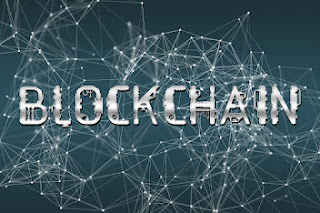Blockchain Technology: Explained in Simple Terms
Introduction
You’ve probably heard the term blockchain thrown around a lot, especially when people talk about Bitcoin and cryptocurrencies. But did you know that blockchain isn’t just about digital money? It’s actually a powerful technology that can change industries like banking, healthcare, supply chain management, and even voting systems.
In this article, I’ll explain blockchain in a super simple way, with real-world examples so you can finally understand what all the hype is about!
 |
| 1. Blockchain Technology |
What is Blockchain?
Okay, let’s keep this simple. Imagine a notebook that records every transaction that happens. But instead of one person controlling it, this notebook is copied and shared across thousands of computers worldwide.
Once you write something in this notebook, it can’t be erased or changed. That’s blockchain in a nutshell—it’s a secure, transparent, and decentralized way of storing information.
Key Features of Blockchain
Decentralized – No single person or company owns it.
Transparent – Everyone can see what’s written.
Secure – Uses encryption to prevent fraud.
Immutable – Once a transaction is recorded, it stays forever.
Fast & Efficient – No need for middlemen like banks to approve transactions.
How Does Blockchain Work?
Let’s say Alice wants to send ₹1,000 to Bob using a blockchain-based payment system instead of a bank. Here’s what happens:
Alice sends the money – She enters Bob’s wallet address and the amount.
The transaction is verified – Multiple computers in the network (called nodes) check if Alice actually has ₹1,000.
The transaction is added to a block – It gets grouped with other transactions.
The block is added to the blockchain – Using special algorithms (like Proof of Work or Proof of Stake), it becomes a permanent part of the system.
Bob receives the money – The transaction is now complete, and it’s stored forever on the blockchain.
This process happens without a bank or any third party, which makes transactions cheaper, faster, and more secure.
 |
| 2. Uses of Blockchain Technology |
Types of Blockchains
Blockchain isn’t just for cryptocurrency! There are different types used for different purposes.
1. Public Blockchain
🔹 Open to everyone (e.g., Bitcoin, Ethereum)
🔹 Completely decentralized
🔹 Anyone can participate in verifying transactions
2. Private Blockchain
🔹 Only selected users can access it (e.g., Hyperledger, Corda)
🔹 Controlled by a company or organization
🔹 Used in businesses for private data sharing
3. Hybrid Blockchain
🔹 A mix of public and private blockchain
🔹 Offers flexibility—some data is private, some public
🔹 Used in industries like healthcare and banking
Where is Blockchain Used in the Real World?
Blockchain is already changing the way many industries work. Here are some real-life applications:
1. Financial Transactions 💰
No banks, no middlemen = cheaper & faster money transfers
Cross-border payments settle in minutes instead of days
Examples: Bitcoin, Ethereum, Ripple
2. Smart Contracts 📜
Think of it as an automatic contract that executes itself
No need for lawyers or middlemen
Used in real estate, insurance, and supply chains
3. Supply Chain Tracking 🚚
Tracks products from manufacturing to delivery
Prevents fake products from entering the market
Ensures food & medicine safety
4. Healthcare Data Security 🏥
Protects patient records from hacking
Allows easy & secure sharing of medical history
Reduces medical fraud
5. Voting Systems 🗳️
Secure and tamper-proof elections
Eliminates voter fraud
Increases transparency

3. Blockchain Technology
Pros and Cons of Blockchain
✅ Advantages
✔ Super Secure – Transactions are encrypted and hard to hack.
✔ Full Transparency – Anyone can verify transactions.
✔ No Middlemen – Saves money on bank fees.
✔ Faster Transactions – No waiting days for payments to clear.
✔ Immutable Data – No one can secretly change records.
❌ Disadvantages
✖ Uses Lots of Energy – Bitcoin mining consumes massive electricity.
✖ Can Be Slow – Some networks get congested.
✖ Not Fully Regulated – Governments are still figuring out laws for crypto and blockchain.
✖ Difficult to Understand – Takes time to learn how it works.
FAQs About Blockchain
1. Can blockchain be hacked?
🔹 Not easily! A hacker would need to change thousands of computers at the same time, which is nearly impossible.
2. Is blockchain only for cryptocurrency?
🔹 Nope! It’s also used in finance, healthcare, supply chain, and even voting systems.
3. Will blockchain replace banks?
🔹 Not completely, but it will force banks to adapt and improve their services.
4. What is a smart contract?
🔹 A contract that automatically executes when conditions are met, without needing a lawyer.
Final Thoughts
Blockchain is more than just Bitcoin and cryptocurrency—it’s a game-changing technology that can revolutionize industries. Whether it’s faster money transfers, more secure voting, or better supply chain tracking, blockchain is proving its worth in the real world.
We’re still in the early days, but as more companies adopt blockchain, we’ll see even more innovations. Who knows? Maybe in the future, your salary will be paid in crypto, and you’ll vote using blockchain! 🚀
💡 What do you think? Will blockchain change the world? Drop your thoughts in the comments!





.jpeg)
2 Comments
Nice explanation 👍
ReplyDeleteExcellent 👌
ReplyDeleteAny Doubts Feel Free And Drop A Comment!